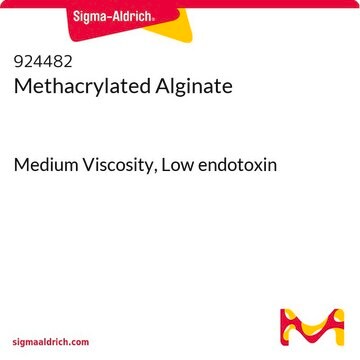923850
Alginate Aldehyde
20% aldehyde content, medium viscosity
Synonyme(s) :
Alginate aldehyde, Oxidized alginate
About This Item
Produits recommandés
Niveau de qualité
Description
Degree of functionalization: 15-25%
Forme
powder
Couleur
white to off-white
Adéquation
conforms to structure for NMR
Température de stockage
2-8°C
Chaîne SMILES
CO[C@H]1[C@@H](O)[C@H](O)[C@H](O/C(C=O)=C\C([O-])=O)O[C@@H]1C([O-])=O.OC2[C@H](OC(O)C=O)[C@@H](C([O-])=O)O[C@@H](OC)[C@H]2O
Vous recherchez des produits similaires ? Visite Guide de comparaison des produits
Application
Alginate is commonly crosslinked into a hydrogel via ionic-crosslinking with divalent cations (e.g., Ca2+). To prevent matrix degradation, alginate can be functionalized with reactive groups that can be chemically crosslinked, such as aldehydes. Aldehyde- functionalized alginate can be used to prepare hydrogels by reaction with amine groups, such as gelatin through Schiff-base reaction to form a chemical hydrogel. This material can be used in a variety of biomedical applications such as the delivery of drugs, cells, or biomolecules in different tissues, wound healing, and muscle and bone tissue engineering.
Code de la classe de stockage
11 - Combustible Solids
Classe de danger pour l'eau (WGK)
WGK 3
Point d'éclair (°F)
Not applicable
Point d'éclair (°C)
Not applicable
Faites votre choix parmi les versions les plus récentes :
Certificats d'analyse (COA)
Vous ne trouvez pas la bonne version ?
Si vous avez besoin d'une version particulière, vous pouvez rechercher un certificat spécifique par le numéro de lot.
Déjà en possession de ce produit ?
Retrouvez la documentation relative aux produits que vous avez récemment achetés dans la Bibliothèque de documents.
Notre équipe de scientifiques dispose d'une expérience dans tous les secteurs de la recherche, notamment en sciences de la vie, science des matériaux, synthèse chimique, chromatographie, analyse et dans de nombreux autres domaines..
Contacter notre Service technique







